|
|
|
Sort Order |
|
|
|
Items / Page
|
|
|
|
|
|
|
| Srl | Item |
| 1 |
ID:
140824
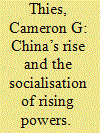

|
|
|
|
|
| Summary/Abstract |
The rise of China, and other states whose material power and ideational aspirations have outpaced that of their peers, presents an interesting challenge to international relations theorists. Structural theories rooted in realism tend to predict that changes in material power inexorably lead to conflict that reshuffles the pecking order at the pinnacle of the international system. Such theories also tend to ignore identity and other ideational factors that may condition the interaction of rising and dominant great powers. This article develops a theoretical approach to state socialisation of rising powers. While considering the importance of increasing material capabilities, this approach also examines the types of roles that states occupy in the international social system and the ability of great powers to socialise rising powers into what they consider to be appropriate roles. The 1995–1996 Taiwan Straits Crisis is analysed through this theoretical framework to demonstrate that although both China and the United States attempted to altercast each other in a socialisation process, neither was successful. China pursued its own, self-conceived role conceptions in the situation, as did the United States, setting the stage for renewed rivalry between the two powerful states. The case demonstrates the difficulty of constraining rising powers’ aspirations when their material power allows them to pursue the identities of their choice, even in the face of strong socialisation efforts from the dominant power and its supporters.
|
|
|
|
|
|
|
|
|
|
|
|
|
|
|
|
| 2 |
ID:
144445


|
|
|
|
|
| Summary/Abstract |
Regardless of the outcome, civil wars are destructive events. They not only devastate the physical and human capital of a society, but also have a direct effect on state capacity. The capacity of the state is critical as it attempts to rebuild society and minimize the risk of a new civil conflict; yet, it is still not clear how civil war precisely affects state capacity. In general, we argue that incumbent victors are more likely to end with a stronger state when the conflict is short and the victory is decisive. In contrast, rebel victors require more time to build their internal capacity and thus have stronger states after a longer conflict, especially when they had access to lootable resources.
|
|
|
|
|
|
|
|
|
|
|
|
|
|
|
|
| 3 |
ID:
140280


|
|
|
|
|
| Summary/Abstract |
One of the shortcomings of foreign policy role theory is its tendency to black-box the state. Role theorists often assume a national role conception, without paying too much attention to the domestic political processes regarding how a role is selected to represent the state out of a number of potential competing roles. We develop a model of role contestation and role selection that draws on existing knowledge of foreign policy creation resulting from competition between governing elites and opposition, multi-party coalitions, cabinet dynamics, and bureaucratic politics. We incorporate expectations from role theory to explain how conflict over role selection may be resolved. The model is examined in light of several cases in immediate post-war Germany. We find that government and opposition dynamics are the primary sources of contestation over NRCs in our cases, some evidence for bureaucratic politics, and little evidence that coalition politics was at play. Finally, there were few instances in which role conflict resolution mechanisms were used.
|
|
|
|
|
|
|
|
|
|
|
|
|
|
|
|
| 4 |
ID:
076700
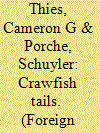

|
|
|
| 5 |
ID:
107883
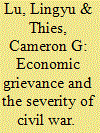

|
|
|
|
|
| Publication |
2011.
|
| Summary/Abstract |
This article examines the relationship between economic grievance and the severity of civil war. Theoretically, we create a testable micro-foundation for the association between economic grievance and conflict intensity. We argue that grievance does not lessen after the onset of civil war. Rather, pent-up grievance aggravates violence during the war. The more relative deprivation there is prior to the conflict, the more deadly and violently participants are expected to behave on the battlefield. This proposition is tested in a statistical analysis using the Armed Conflict Dataset (1960-92). Empirically, we demonstrate that economic grievance makes civil war more deadly. This effect is independent of the effect of ethnic grievance.
|
|
|
|
|
|
|
|
|
|
|
|
|
|
|
|
| 6 |
ID:
053513
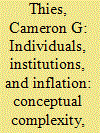

|
|
|
| 7 |
ID:
111632
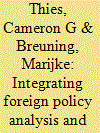

|
|
|
|
|
| Publication |
2012.
|
| Summary/Abstract |
We argue that role theory offers the possibility of integrating Foreign Policy Analysis (FPA) and International Relations (IR) theory. While role theory was originally adapted for use by U.S.-based FPA scholars, it was later picked up by European scholars as well as the Constructivist IR community. The ISA Workshop that generated this special journal issue was designed to bring together scholars from these various research traditions to pursue integration and synthesis. The resulting papers contained in this issue have set the stage for a productive conversation that has continued well beyond the initial workshop. Role theory does appear to offer the possibility of integration and even synthesis across FPA and IR as demonstrated in the following papers. We believe that this special issue highlights numerous avenues to continue the fruitful development of this research program.
|
|
|
|
|
|
|
|
|
|
|
|
|
|
|
|
| 8 |
ID:
111634
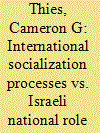

|
|
|
|
|
| Publication |
2012.
|
| Summary/Abstract |
This paper develops a theoretical approach to state socialization grounded in role theory. Role theory, in particular the role location process, offers a way to connect grand International Relations theory and inquiry to the analysis of specific foreign policy actions through the socialization concept. The role location process is presented as a stylized socialization "game" that models the interaction of a state, its socializer(s), and the interested audience as it reacts to cues and demands. This model is then applied to several episodes of early Israeli history (1948-1956) covering the emergence of the sovereign state through its achievement of small state status in the aftermath of the Suez Crisis.
|
|
|
|
|
|
|
|
|
|
|
|
|
|
|
|
| 9 |
ID:
177608
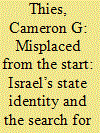

|
|
|
|
|
| Summary/Abstract |
This paper considers the elements that constitute Israel’s state identity, from its deepest layers of corporate identity through the middle layer of identification processes between self and other, to the most superficial layer at which political entrepreneurs are able to shape aspects of identity in the short term. Israel’s state identity is examined through the use of roles, alongside other elements of societal identity upon which it supervenes. Continuities and changes in Israel’s state identity are analyzed from independence in its geographic region through efforts to reimagine its cognitive region in the Mediterranean or Europe. While Israel is often frustrated in its inability to enact roles commensurate with its status in its geographic region, there is little agreement over what cognitive region this misplaced state really belongs in. For the moment, Israel remains a misplaced state in its geographic region.
|
|
|
|
|
|
|
|
|
|
|
|
|
|
|
|
| 10 |
ID:
091120
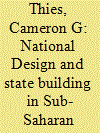

|
|
|
|
|
| Publication |
2009.
|
| Summary/Abstract |
This article examines the political geography of state building in contemporary sub-Saharan Africa. The absence of interstate war has produced a unique situation for contemporary state builders in Africa-they have inherited states with relatively fixed borders encapsulating a variety of environmental and geographic conditions, compounded by varying distributions of population densities. The author examines the effects of a variety of strategies that African rulers have employed to enhance their state-building efforts given the type of national design they inhabit. These strategies include the allocation of citizenship, interventions in land tenure patterns, and the adoption and management of national currencies. The author tests the effects of these strategies on several dimensions of state capacity in sub-Saharan Africa from 1960 to 2004 using a variety of statistical analyses. The results indicate that the strategies currently adopted by african rulers have generally failed to substantially augment their capacity.
|
|
|
|
|
|
|
|
|
|
|
|
|
|
|
|
| 11 |
ID:
178497
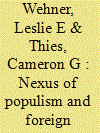

|
|
|
|
|
| Summary/Abstract |
The term populism has recently gained visibility in the media and policy world to describe the foreign policy principles, rhetoric and strategies of political actors in the United States and some European states. Yet, populism is nothing new in Latin America where it has enjoyed a long tradition among leaders of various countries. Populism has thus far largely been treated as a national phenomenon with few international manifestations. Thus, this article adopts the concept of populism and its core components such as anti-elitism, the people, and the general will within a role theory framework to trace the foreign policy roles that populist governments play as a first step to improving our knowledge on the nexus of populism and foreign policy. We examine this framework in the context of the foreign policy of Carlos Menem of Argentina and Hugo Chávez of Venezuela.
|
|
|
|
|
|
|
|
|
|
|
|
|
|
|
|
| 12 |
ID:
097770
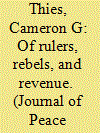

|
|
|
|
|
| Publication |
2010.
|
| Summary/Abstract |
This article investigates the relationship between civil war onset and state capacity through a focus on the role of primary commodities. This is accomplished by moving the focus of the civil war literature away from an almost exclusive concern with the incentives of rebels to a consideration of both rebels and rulers as revenue seeking predators. This predatory theory approach expects that higher levels of state capacity should deter civil war onset, while civil war onset should reduce state capacity. Further, natural resource rents are expected to enhance state capacity, rather than increase the likelihood of civil war onset. In order to deal with the endogeneity posed by including fiscal measures of state capacity in single equation models of civil war onset, this study employs a simultaneous equations framework. This framework allows us to capture the effects of civil war onset on state capacity and vice versa, as well as the effects of primary commodities on both endogenous covariates. The main findings from the statistical analyses include: state capacity does not affect civil war onset, but civil war onset reduces state capacity; and primary products directly affect only state capacity - they do not directly affect civil war onset, as found in previous contributions to the literature.
|
|
|
|
|
|
|
|
|
|
|
|
|
|
|
|
| 13 |
ID:
170607
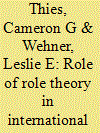

|
|
|
|
|
| Summary/Abstract |
This article demonstrates the benefits of using a role theory approach in the field of international political economy (IPE) by demonstrating its benefits relative to variants of the social constructivist paradigm, especially vis-à-vis identity-based accounts of IPE. This article also documents how role theory always had a home in IPE even before the constructivist revolution in the 1990s. The social interactionist dimension in the work of Herbert Mead and his notion of a general other are linked to the relational ideas of friendship and impartial spectator present in the works of the founding father of classical political economy, Adam Smith. These similar ideas about the self and their surrounding social environment are a useful starting point to locate role theory in IPE and demonstrate its analytical advantages within social constructivism. After showing the ‘forgotten’ place role theory has always had in IPE, the article illustrates the potential of using a role theory approach within the field of IPE through an illustrative analysis of the Greek economic crisis.
|
|
|
|
|
|
|
|
|
|
|
|
|
|
|
|
| 14 |
ID:
153431
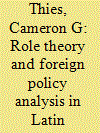

|
|
|
|
|
| Summary/Abstract |
This paper generates a framework to understand Latin American foreign relations through the use of Foreign Policy Analysis (FPA) role theory. The use of roles to describe and analyze regional interstate relations has previously been found in the literature on Latin America, but these studies have not taken advantage of the full range of concepts and theoretical implications associated with role theory to analyze the region. The paper develops a typology of states with associated national role conceptions (NRCs) and generates expectations for the sources of those NRCs, as well as elements of the role enactment and role location processes for Latin American states. The paper then illustrates the framework's applicability through a brief analysis of the role location process for Venezuela during the Presidency of Hugo Chávez. The analysis of NRCs selected by the leader of Venezuela, and their reception by role partners and the audience of interested states during the role location process demonstrates the fruitfulness of role theory for understanding Latin American regional relations. The analysis also suggests some modifications for FPA role theory itself as a result of the Venezuelan case.
|
|
|
|
|
|
|
|
|
|
|
|
|
|
|
|
| 15 |
ID:
123138
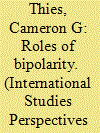

|
|
|
|
|
| Publication |
2013.
|
| Summary/Abstract |
Since the end of the Cold War, scholars have debated the merits of the major theoretical traditions in international relations and foreign policy. Neorealism was criticized for failing to predict the end of bipolarity in material capabilities. Constructivism emerged during this time as a viable alternative explanation for the Cold War based on the role of ideas. This paper seeks to assess the impact of material and ideational factors on the origin, development, and end of the Cold War through an examination of the roles adopted by U.S. Presidents in their foreign policy doctrines. The paper finds that the origin of the Cold War was primarily ideational and was constituted by the "roles of bipolarity" adopted in the Truman Doctrine. During the Cold War, minor variations in these roles can be explained by shifts in material capabilities. The end of the Cold War was the result of changes in Soviet ideas, which were later confirmed by the collapse of the Soviet Union. After the end of bipolarity, we see the United States struggling to identify its proper foreign policy role.
|
|
|
|
|
|
|
|
|
|
|
|
|
|
|
|
| 16 |
ID:
101281
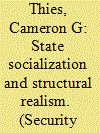

|
|
|
|
|
| Publication |
2010.
|
| Summary/Abstract |
One of the common criticisms of Kenneth Waltz's Theory of International Politics is that its structural model is rather spare. This paper enriches neorealism by specifying the conditioning effects of competition and socialization operating on behalf of the international structure. Despite its neglected status in neorealist theory, I argue that socialization produces important effects on interstate interaction. I develop a model of the socialization process that uses role theory to demonstrate how interstate interaction is structured at the micro-level. Consistent with neorealism, the model assumes that socialization is heavily conditioned by material capabilities, and operates mainly on the adjustment of state behavior. I analyze several episodes of U.S. history to demonstrate that neorealism can explain how unit-level behavior is structured through socialization. The resulting elaboration of neorealism offers a more fully specified structural theory of international politics.
|
|
|
|
|
|
|
|
|
|
|
|
|
|
|
|
| 17 |
ID:
092559
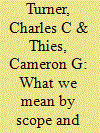

|
|
|
|
|
| Publication |
2009.
|
| Summary/Abstract |
Self-reflective political scientists have extensively reviewed the history of the discipline and argued over its future, but to date there has been little effort to systematically survey undergraduate scope and methods courses (for an exception see Thies and Hogan 2005). This lack of data leaves the discipline unable to assess how much we are teaching undergraduates about the scope of political science or, indeed, what we mean by the scope of the discipline. Similarly, though there have been many battles waged over the appropriateness of various methodologies, it is not clear how much of this discussion, or how many of these methods, make it into the undergraduate classroom. Survey results from a nation-wide sample of political science departments indicate that most departments require a scope and methods course of their majors and that, while there is a great deal of variety in topics covered, some common themes exist and some common assignments are used.
|
|
|
|
|
|
|
|
|
|
|
|
|
|
|
|
|
|
|
|
|